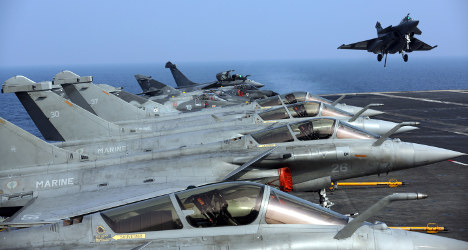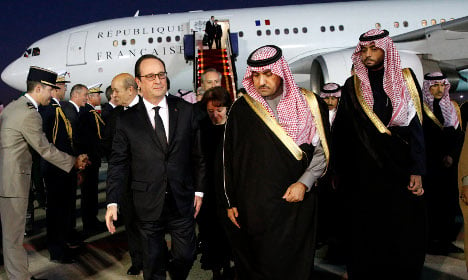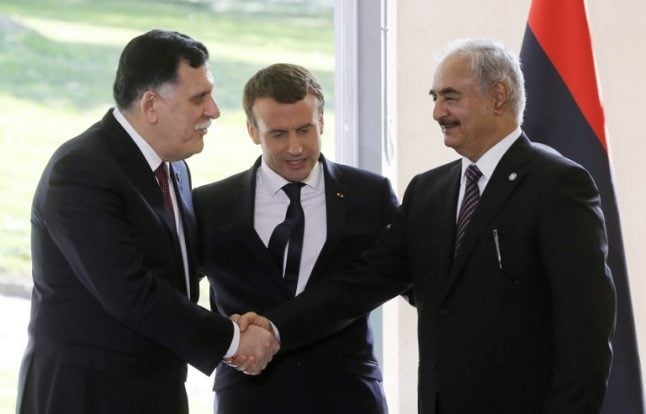It struggled for years to sell its Rafale jets abroad but French defence group Dassault has finally scored several lucrative deals, thanks in part to anti-US suspicion in the Middle East, experts say.
Egypt was the first buyer, ordering 24 planes in February. India followed suit with 36 fighter jets in early April.
On Monday, wealthy Qatar signed a deal for 24 jets, in a ceremony in Doha attended by President Francois Hollande.
The contract was signed by Dassault CEO Eric Trappier and Qatari General Ahmed al-Malki, who oversaw negotiations for the €6.3-billion ($7-billion) deal.
France may soon be celebrating again as negotiations with the United Arab Emirates appear to be headed in the "right direction", according to Foreign Minister Laurent Fabius.
"For a long time, there were doubts about this Rafale," Hollande admitted last week when the Qatar deal was announced, before applauding the deal as "good news" for the country.

French, US policies key
Brushing aside concerns about client countries' rights abuses, France has consistently hailed the Rafale sales abroad as a success for both Dassault and French diplomacy.
Experts say that aside from the fighter jets' proven successes in combat zones like Afghanistan, Libya or Iraq, French policy in the Middle East has played a significant role in securing the sales.
"It's more specific to the Gulf countries which appreciate France's coherence" in its foreign policy, said Bruno Tertrais of the Paris-based Foundation for Strategic Research think tank.
On Tuesday, Hollande will be the guest of honour at a summit in Riyadh of the six-member Gulf Cooperation Council — a first for a Western leader.
Tertrais pointed to the summer of 2013, when Hollande said he was determined to punish the Syrian regime of Bashar al-Assad, who had just been accused of unleashing chemical weapons on his people.
At the time, US President Barack Obama backed down from a seemingly imminent military intervention, despite having vowed chemical weapons were a "red line" in the Syrian conflict.
Tertrais also said the US response to the Arab Spring — particularly in Egypt, where Washington dropped support for ousted president Hosni Mubarak in February 2011 — shocked its allies in the Middle East.
Francois Heisbourg, chairman of the International Institute for Strategic Studies, said countries in the region also remember the US arms embargo imposed on Turkey after it invaded Cyprus in 1974, which included stopping the delivery of spare parts for its military aircraft.
He also said "the French have shown they are negotiating hard" with Iran on its nuclear programme, which Tehran insists is for peaceful purposes, but the West believes is aimed at making an atomic bomb.
In contrast, the Americans "appear more flexible" with Iran, the Shiite enemy of the Sunni Gulf monarchies, Heisbourg said.
Rights concerns
"In this region of the world, France has a strategic position that is coherent and understood," Defence Minister Jean-Yves Le Drian said in an interview Sunday with the French JDD weekly.
Le Drian, most of whose 33 trips to the Middle East have been confidential, was in the UAE again this weekend.
The first foreign order by Egypt also acted as a catalyst, after multiple failed bids to sell the Rafale to South Korea, Singapore, Morocco, Switzerland and Brazil.
But the sale to Cairo sparked fury from rights groups, including Amnesty International, which accused the government of committing "alarming" abuses.
Egyptian President Abdel Fattah al-Sisi was elected in May 2014 with 96.91 percent of the vote a year after toppling the country's first freely elected leader, Islamist Mohamed Morsi.
A subsequent crackdown on Morsi's supporters left at least 1,400 dead and thousands more in jail.
Qatar has also faced heavy criticism over its rights record, particularly over its treatment of migrant workers.



 Photo: AFP
Photo: AFP  Please whitelist us to continue reading.
Please whitelist us to continue reading.
Member comments